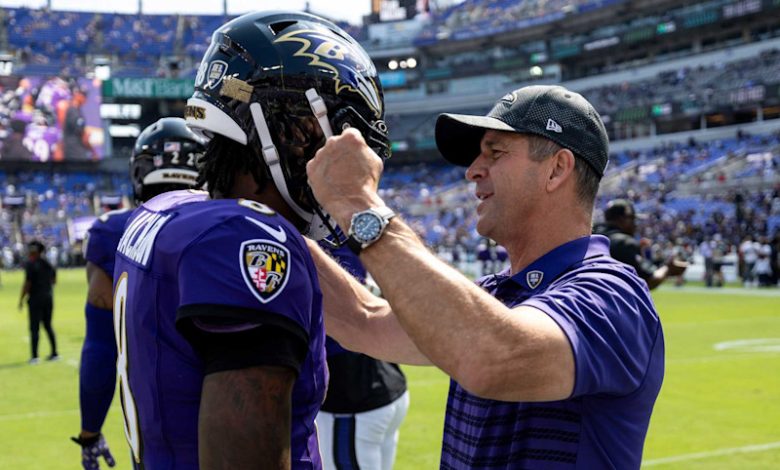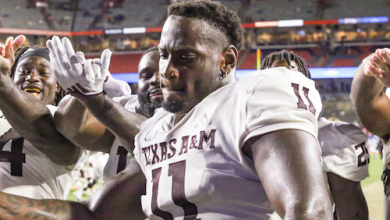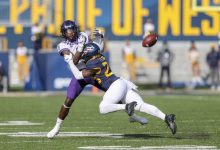The Patriots’ Lamar Jackson mistake turned into the Ravens’ fortune, fueling their success and Jackson’s rise to stardom.

The New England Patriots’ decision not to draft Lamar Jackson, despite his undeniable potential and talents, proved to be one of the most significant mistakes in the franchise’s storied history. However, that mistake turned into an incredible stroke of luck for the Baltimore Ravens, transforming their entire future and leading to the rise of one of the most dynamic quarterbacks the NFL has ever seen. This turn of events not only altered the course of both teams but also reshaped the trajectory of the NFL itself. Lamar Jackson’s path to stardom and the Ravens’ subsequent success is a fascinating story of timing, opportunity, and the unpredictable nature of sports.
The Patriots’ Missed Opportunity
To fully appreciate the magnitude of the Patriots’ mistake, it’s important to look back at the 2018 NFL Draft. The Patriots were coming off another Super Bowl appearance, having narrowly lost to the Philadelphia Eagles. Tom Brady, the legendary quarterback, was still at the helm, and the team was as successful as ever. However, the Patriots’ future beyond Brady was a question mark. Brady was 41 years old, and while he showed no signs of slowing down, there were growing concerns about how much longer he could play at an elite level.
As the draft approached, the Patriots were in need of a quarterback who could potentially take the reins after Brady’s eventual departure. At the time, the 2018 quarterback class was highly touted, with several prospects drawing attention. The consensus top quarterbacks included Baker Mayfield, Sam Darnold, Josh Rosen, and Josh Allen. But there was one player who stood out for his unique style and potential: Lamar Jackson.
Jackson had just completed a remarkable career at the University of Louisville, where he won the prestigious Heisman Trophy as a sophomore and showcased an extraordinary combination of arm strength, accuracy, and perhaps most notably, running ability. His ability to extend plays with his legs and make defenders miss in the open field was something the NFL had rarely seen from a quarterback. Despite his successes, Jackson was often overlooked by many traditional analysts who questioned his ability to transition to the NFL as a quarterback due to his unconventional playing style.
The Patriots, however, were in prime position to take Jackson. By the time the 2018 NFL Draft rolled around, the Patriots had the 23rd overall pick. With several teams ahead of them showing no serious interest in Jackson, it appeared that the Patriots might have the chance to pick him and set themselves up for the post-Brady era. However, they chose not to take that risk. Instead, they selected Georgia offensive lineman Isaiah Wynn, a solid pick for their current needs but not one that addressed their future quarterback situation.
Meanwhile, Lamar Jackson began to slip down the draft board. The Baltimore Ravens, who had the 32nd pick in the first round (thanks to a trade with the Philadelphia Eagles), were still searching for a potential quarterback of the future. They saw Jackson’s incredible potential, and despite concerns about his unconventional playing style, they took a chance on him, making him the 32nd overall pick in the 2018 draft.
The Ravens’ Bold Decision
The Ravens’ decision to draft Lamar Jackson was both bold and risky. Many analysts were skeptical about Jackson’s ability to succeed in a traditional NFL offense, questioning whether he could be more than just a running quarterback. The league had not yet fully embraced the dual-threat quarterback, and many thought Jackson’s unique skill set would make him an outlier rather than a trendsetter.
But the Ravens had a history of embracing innovation. Under head coach John Harbaugh and offensive coordinator Marty Mornhinweg, the Ravens were willing to experiment with Jackson’s unique talents, creating a system tailored to his strengths. The Ravens’ front office and coaching staff believed Jackson could be molded into an elite quarterback, and they were willing to work around his skill set rather than force him into a traditional mold.
Jackson’s rookie season saw him initially serve as a backup to veteran quarterback Joe Flacco. However, after Flacco suffered an injury midseason, Jackson took over as the starter, leading the Ravens to a 6-1 record over the final seven games and securing the team’s first playoff berth in four years. His performance during this stretch, which included several electrifying runs and clutch performances, immediately showcased his potential.
What truly set Jackson apart from other quarterbacks was his ability to make plays with his legs. While many quarterbacks were capable of running when needed, Jackson was able to consistently turn broken plays into explosive gains. His vision, agility, and speed made him a nightmare for defenses. He finished the 2018 season with over 600 rushing yards and several highlight-reel runs. But Jackson wasn’t just a running quarterback; he showed flashes of a strong arm and the ability to throw accurate passes downfield, especially in high-pressure situations.
Lamar Jackson’s Rise to Stardom
In 2019, Jackson took his game to another level. Under new offensive coordinator Greg Roman, the Ravens completely overhauled their offense to better suit Jackson’s skill set. The Ravens shifted to a run-heavy offense, with Jackson leading the charge. The team built an offense around Jackson’s ability to make quick decisions, read defenses, and extend plays with his legs. This offense was unique, featuring a combination of option plays, read-option looks, and a running game that kept defenses off balance.
The results were remarkable. Jackson led the Ravens to a 14-2 record, the best in the NFL that season, and he became the youngest quarterback in NFL history to win the MVP award. He finished the year with over 3,100 passing yards, 36 touchdowns, and an NFL-record 1,206 rushing yards for a quarterback. His ability to both pass and run the ball at an elite level made him virtually unstoppable, and his impact on the Ravens’ offense was immediate.
In addition to his individual accomplishments, Jackson’s success revitalized the Ravens as a franchise. They became one of the most feared teams in the NFL, with a potent offense and a defense that complemented Jackson’s dynamic playmaking ability. The Ravens’ turnaround from a team with a questionable quarterback situation to a perennial playoff contender was a direct result of Jackson’s talents and the organization’s willingness to embrace a new style of play.
The Patriots’ Decline
Meanwhile, the Patriots’ decision to pass on Lamar Jackson became more glaring as the years went on. Tom Brady’s eventual departure after the 2019 season, when he signed with the Tampa Bay Buccaneers, left the Patriots in a quarterback crisis. The team struggled to find a long-term solution at the position, with Cam Newton briefly taking the reins in 2020 before being replaced by rookie Mac Jones in 2021.
While Jones showed promise, the Patriots’ offense lacked the excitement and explosive potential that Lamar Jackson brought to the Ravens. The Patriots, known for their consistency and dominance during the Brady era, now found themselves in unfamiliar territory: rebuilding without a clear quarterback of the future. This stark contrast highlighted the magnitude of their mistake in passing on Jackson.
The NFL’s Shift in Quarterback Play
Jackson’s rise also marked a larger shift in the NFL’s approach to quarterback play. His success helped validate the dual-threat quarterback as a legitimate option in the modern NFL. Teams began to realize that a quarterback with the ability to both pass and run could be just as effective, if not more dangerous, than the traditional pocket passer. Players like Patrick Mahomes, Kyler Murray, and Jalen Hurts further exemplified the changing landscape of the quarterback position, all of whom demonstrated a blend of athleticism and arm talent that made them more versatile than ever before.
The Ravens, by taking a chance on Jackson, were ahead of the curve. They understood that the future of the NFL was likely to feature more mobile quarterbacks who could create offense in multiple ways. The Patriots, by contrast, stuck with a more traditional approach and missed the opportunity to capitalize on the changing nature of the game.









